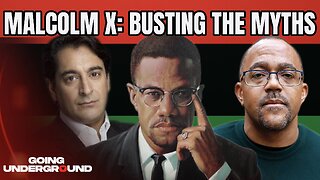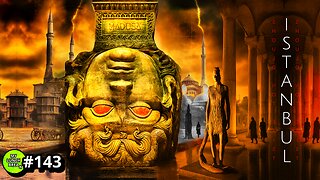Premium Only Content

Now Legal - Ultra-Orthodox Military Conscription in Israel
In Israel, the discourse surrounding ultra-Orthodox military conscription is multifaceted, intertwining historical legacies with contemporary legal battles and political tensions. Against the backdrop of recent events, including a Hamas attack on Israel and subsequent military responses, the issue has garnered renewed attention, sparking debates that delve into the very essence of Israeli identity and societal cohesion
At the core of the debate lies the longstanding exemption granted to full-time religious students, allowing them to focus on religious studies rather than mandatory military service. This exemption, deeply rooted in Israel's history and demographic realities, has faced mounting criticism from various segments of Israeli society, particularly during times of conflict when the burden of military service falls disproportionately on those who do serve.
Recent developments, such as the landmark ruling by Israel's Supreme Court ordering an end to government subsidies for ultra-Orthodox men who do not serve in the army, have further amplified tensions and raised fundamental questions about equality, civic duty, and the role of religion in the state. Prime Minister Benjamin Netanyahu, caught between competing interests within his government and the judiciary, finds himself navigating treacherous political waters as he seeks to maintain stability and address the demands of different constituencies.
Amidst the legal and political wrangling, it is crucial to recognize the historical contributions of Jewish soldiers and warriors, whose feats of courage and sacrifice have helped shape the destiny of the Jewish people and the State of Israel. From biblical times to the present day, Jewish soldiers have played pivotal roles in defending their homeland and ensuring its survival against myriad threats.
The story of King David, revered in Jewish tradition for his military prowess and leadership, exemplifies the courage and resilience of Jewish warriors throughout history. From his legendary victory over the Philistine giant Goliath to establishing Jerusalem as the capital of Israel, David's legacy continues to inspire generations of soldiers and leaders.
Similarly, figures like Joshua, who led the Israelites in their conquest of the Promised Land, and Gideon, who defeated the Midianites with a small band of valiant warriors, symbolize the triumph of faith and courage in the face of adversity. Their stories chronicled in the Hebrew Bible, serve as timeless reminders of the indomitable spirit of the Jewish people.
In more recent history, the heroic deeds of soldiers like Yoni Netanyahu, who led the daring Entebbe raid to rescue hostages from terrorist captivity, and Roi Klein, who sacrificed his life to save his fellow soldiers during the Second Lebanon War, underscore the enduring commitment of Israeli soldiers to defend their country at all costs.
Additionally, the legacy of Judah Maccabee, the renowned Jewish military leader who led the Maccabean Revolt against the oppressive rule of the Seleucid Empire, remains a source of inspiration for Israelis today. His victory over the forces of Antiochus IV and the rededication of the Second Temple during the festival of Hanukkah serve as enduring symbols of Jewish resistance and perseverance in the face of tyranny.
As Israel grapples with the complexities of ultra-Orthodox military conscription, it is imperative to honor the legacy of these Jewish soldiers and warriors, whose courage and selflessness embody the ideals of service and sacrifice. Their stories serve as a poignant reminder of the profound responsibility entrusted to those who defend the nation and inspire us to strive for a future where all Israelis can contribute to the defense of their homeland, irrespective of background or belief.
The path forward is fraught with challenges, but by acknowledging the contributions of Jewish soldiers past and present, we can forge a path toward greater unity, understanding, and inclusivity in Israeli society. Only by confronting the complexities of the past and embracing the diversity of experiences and perspectives can we hope to build a stronger, more resilient future for generations to come.
-
 29:09
29:09
Afshin Rattansi's Going Underground
1 day agoThe Political Life of Malcolm X: Busting the Myths (Prof. Kehinde Andrews)
1.41K9 -
 1:33:56
1:33:56
MattMorseTV
2 hours ago $17.58 earned🔴Exposing his PARTNER IN CRIME.🔴
34.4K114 -
 1:26:51
1:26:51
vivafrei
6 hours agoCharlie Kirk Assassination - When Peaceful Discussion Becomes Impossible - With Jose Vege
59.4K138 -
 2:04:12
2:04:12
Mally_Mouse
22 hours ago🌶️ 🥵Spicy BITE Saturday!! 🥵🌶️- Let's Play: Supermarket Together
24.1K2 -
 1:15:37
1:15:37
BooniesHQ
6 hours ago $6.10 earnedGame Of SKATE Donny Hixson Vs. Chris Massie: Boonies Skate Night 2
42.6K5 -
 2:56:25
2:56:25
Barry Cunningham
7 hours agoTHE TAKING OF CHARLIE KIRK HAS IGNITED A FLAME! AND A BREAKING (BUT NOT SHOCKING) UPDATE!
93K101 -
 9:38
9:38
Exploring With Nug
10 hours ago $2.06 earnedSearching Florida Waters for a Missing Murder Victim’s Car | Alligator Encounter!
27.5K1 -
 2:05:59
2:05:59
SavageJayGatsby
22 hours agoSpicy Bite Saturday | Let's Play: Supermarket Together
23.1K -
 23:23
23:23
MYLUNCHBREAK CHANNEL PAGE
23 hours agoIstanbul Should Not Exist - Pt 1
54.1K27 -
 1:27:40
1:27:40
Jeff Ahern
7 hours ago $10.91 earnedThe Saturday Show With Jeff Ahern
95.6K37